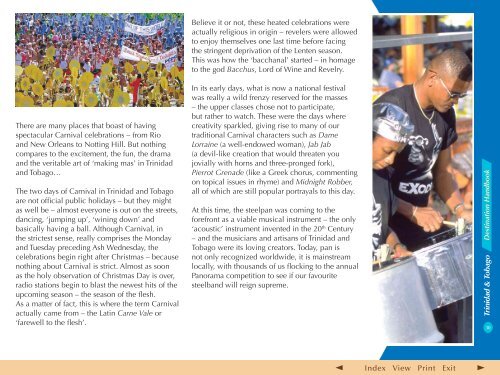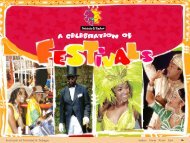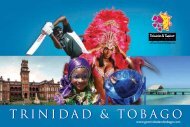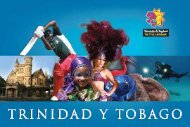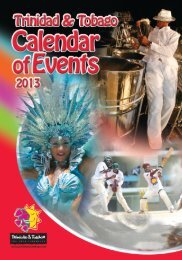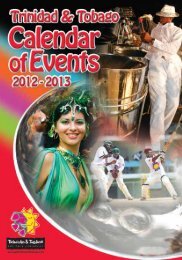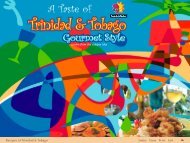Trinidad and Tobago - Destination Handbook
Trinidad and Tobago - Destination Handbook
Trinidad and Tobago - Destination Handbook
Create successful ePaper yourself
Turn your PDF publications into a flip-book with our unique Google optimized e-Paper software.
\ Index View Print Exit /<br />
There are many places that boast of having<br />
spectacular Carnival celebrations – from Rio<br />
<strong>and</strong> New Orleans to Notting Hill. But nothing<br />
compares to the excitement, the fun, the drama<br />
<strong>and</strong> the veritable art of ‘making mas’ in <strong>Trinidad</strong><br />
<strong>and</strong> <strong>Tobago</strong>…<br />
The two days of Carnival in <strong>Trinidad</strong> <strong>and</strong> <strong>Tobago</strong><br />
are not official public holidays – but they might<br />
as well be – almost everyone is out on the streets,<br />
dancing, ‘jumping up’, ‘wining down’ <strong>and</strong><br />
basically having a ball. Although Carnival, in<br />
the strictest sense, really comprises the Monday<br />
<strong>and</strong> Tuesday preceding Ash Wednesday, the<br />
celebrations begin right after Christmas – because<br />
nothing about Carnival is strict. Almost as soon<br />
as the holy observation of Christmas Day is over,<br />
radio stations begin to blast the newest hits of the<br />
upcoming season – the season of the flesh.<br />
As a matter of fact, this is where the term Carnival<br />
actually came from – the Latin Carne Vale or<br />
‘farewell to the flesh’.<br />
Believe it or not, these heated celebrations were<br />
actually religious in origin – revelers were allowed<br />
to enjoy themselves one last time before facing<br />
the stringent deprivation of the Lenten season.<br />
This was how the ‘bacchanal’ started – in homage<br />
to the god Bacchus, Lord of Wine <strong>and</strong> Revelry.<br />
In its early days, what is now a national festival<br />
was really a wild frenzy reserved for the masses<br />
– the upper classes chose not to participate,<br />
but rather to watch. These were the days where<br />
creativity sparkled, giving rise to many of our<br />
traditional Carnival characters such as Dame<br />
Lorraine (a well-endowed woman), Jab Jab<br />
(a devil-like creation that would threaten you<br />
jovially with horns <strong>and</strong> three-pronged fork),<br />
Pierrot Grenade (like a Greek chorus, commenting<br />
on topical issues in rhyme) <strong>and</strong> Midnight Robber,<br />
all of which are still popular portrayals to this day.<br />
At this time, the steelpan was coming to the<br />
forefront as a viable musical instrument – the only<br />
‘acoustic’ instrument invented in the 20 th Century<br />
– <strong>and</strong> the musicians <strong>and</strong> artisans of <strong>Trinidad</strong> <strong>and</strong><br />
<strong>Tobago</strong> were its loving creators. Today, pan is<br />
not only recognized worldwide, it is mainstream<br />
locally, with thous<strong>and</strong>s of us flocking to the annual<br />
Panorama competition to see if our favourite<br />
steelb<strong>and</strong> will reign supreme.<br />
<strong>Trinidad</strong> & <strong>Tobago</strong> <strong>Destination</strong> H<strong>and</strong>book<br />
30


